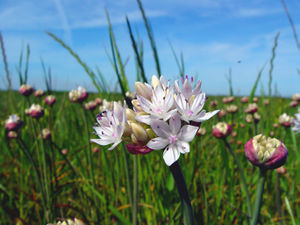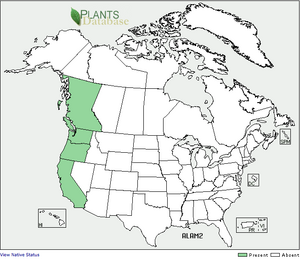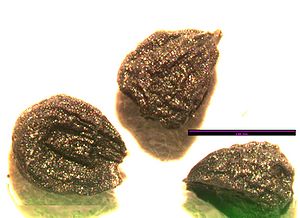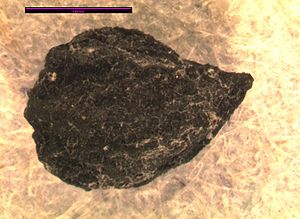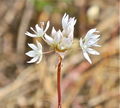Allium amplectens
- Scientific Name: Allium amplectens
- Family: Amaryllidaceae
- Common Names: narrow-leaf onion
- Synonyms/Misapplications: Allium acuminatum, Allium attenuifolium, Allium monospermum, Allium occidentale, Allium serratum
- Codon: ALLAMP
Contents
Taxonomy
| Scientific classification | |
|---|---|
| Kingdom: | Plantae |
| Subkingdom: | Viridiplantae |
| Phylum: | Tracheophyta |
| Class: | Magnoliopsida |
| Subclass: | Lilianae |
| Order: | Asparagales |
| Family: | Amarylidaceae |
| Genus: | Allium L. |
| Species: | Allium amplectens Torr. |
Description
Perennial growing from sometimes clustered and ovoid bulbs. Stem somewhat cylindrical, 15-50 cm tall. 2-4 slender leaves growing from the scape that wither early. Almost spherical multi-flowered white or pink umbels. Tepals 6; pedicals slender 1-2 times length of tepals. Stamens 6 and as long as the tepals. Tepals become papery and converge over fruit with maturity, the fruit 3-celled and 6-seeded.[2] [3]
Bloom Period
May-July [2]
Distribution
California, Oregon, Washington, and British Columbia.[2]
Habitat
Open or wooded areas with clay soils [3]
Uses
The bulbs were occasionally eaten by some northwest coast indigenous peoples.
Propagation
http://www.goert.ca/propagation_guidelines/forbs/allium_amplectens
Seed
Seed sample from: 2011
Average Measurement: 2.1 x 1.7 x 1.7
Measurement Range: L: 1.8 - 2.5, W: 1.5 - 1.8, D: 1.3 - 1.75
Features
Shape: Seeds narrow at hilum end, broadening at opposite apex.
Color: Seeds black. Hilum beige to white.
Surface: Seed’s most distinct feature is extreme puckering or wrinkling. Some seeds have concave pitting, ridging, or some net veined patterns. Seeds roughly textured and matte.
Latitudinal Cross Section: elliptical ![]()
Longitudinal Cross Section: elliptical ![]()
Basic Explanations and Assumptions:
The dimensions for the seeds are length x width x depth. The location of the hilum is used as the base of the seed, and the length is measured from hilum to the opposite apex. Where a style is present, the length is measured from the hilum to the bottom of the style. Width is measured at a right angle to the length at the widest part. Depth is measured at a right angle to the intersection of height and width lines.
Measurements included are the mean average for each measurement of ten separate seeds.
All measurements in millimeters unless otherwise noted.
Photo Gallery
References
- ↑ Integrated Taxonomic Information System. Retrieved from https://www.itis.gov/servlet/SingleRpt/SingleRpt?search_topic=TSN&search_value=42709
- ↑ 2.0 2.1 2.2 WTU Herbarium, Burke Museum, & University of Washington. Retrieved from http://biology.burke.washington.edu/herbarium/imagecollection/taxon.php?Taxon=Allium%20amplectens
- ↑ 3.0 3.1 Jepson Flora Project

